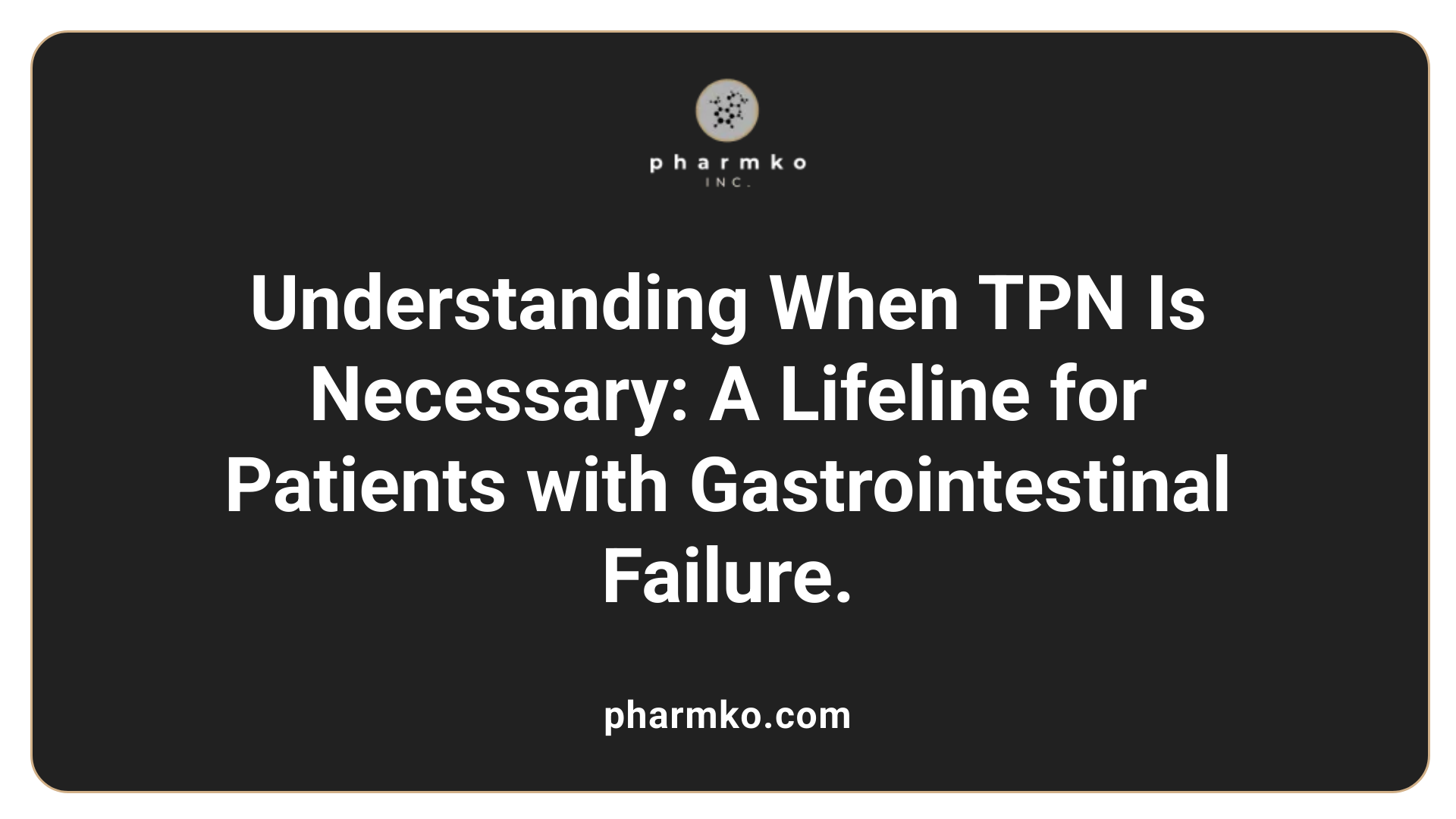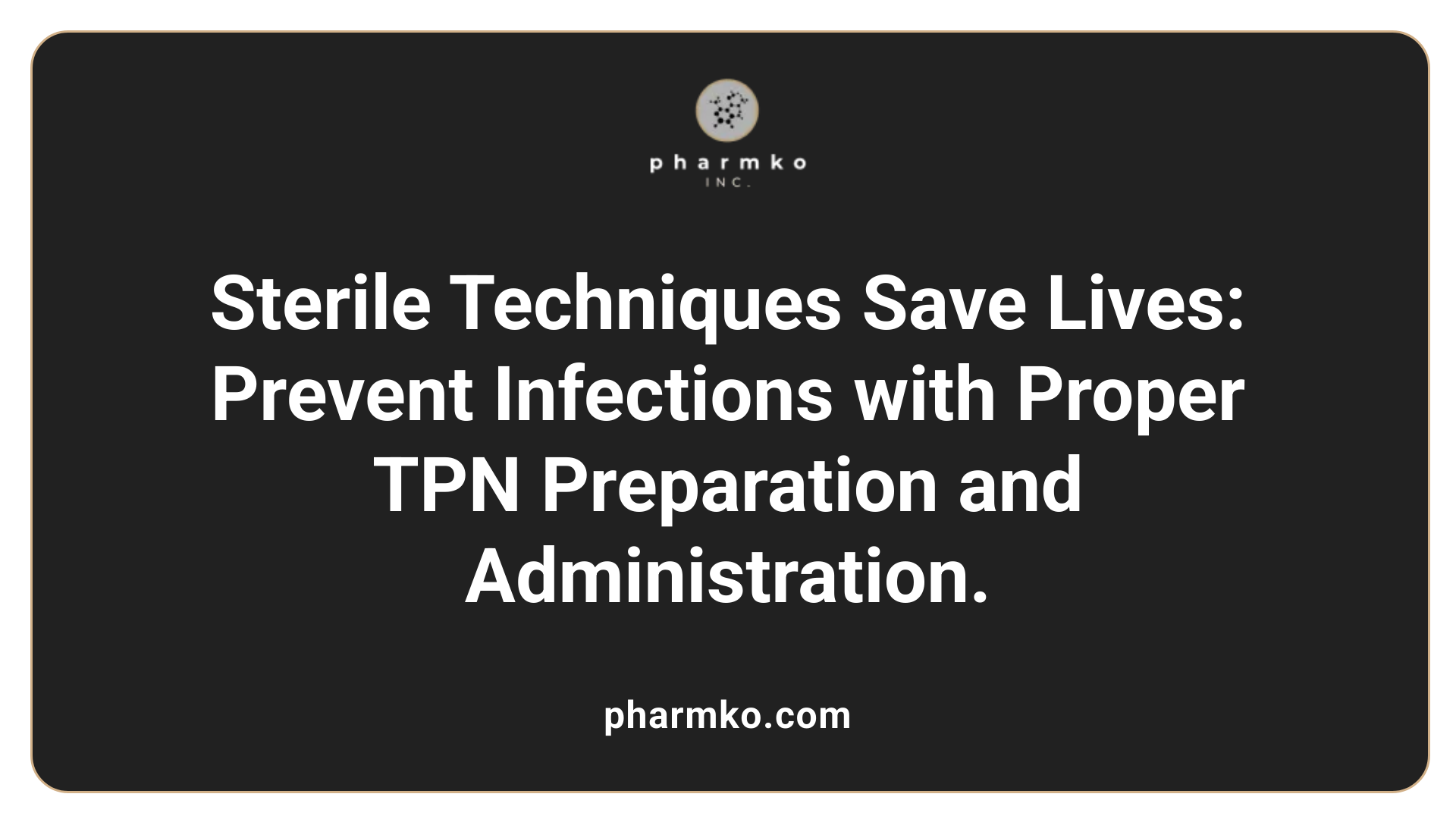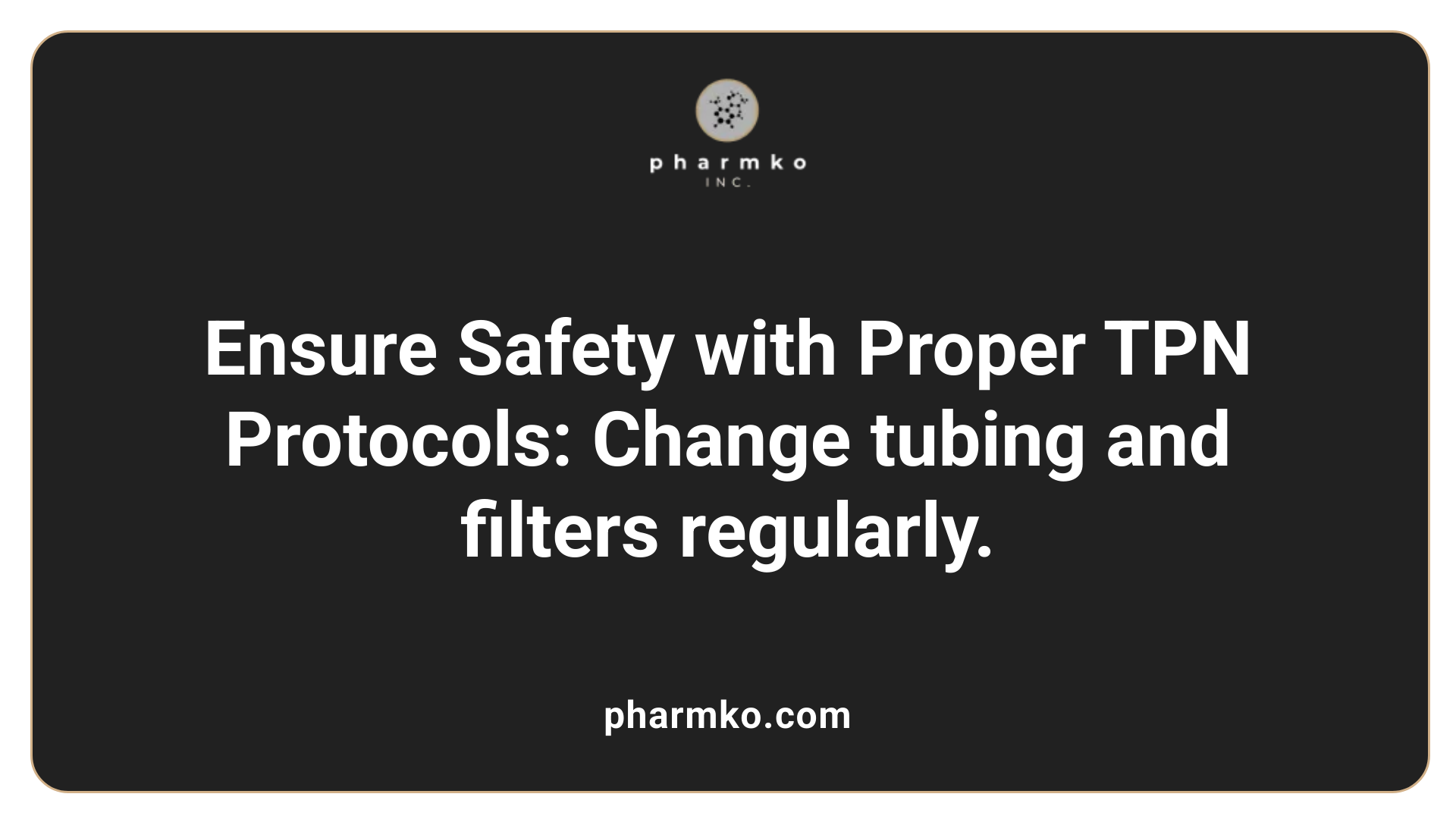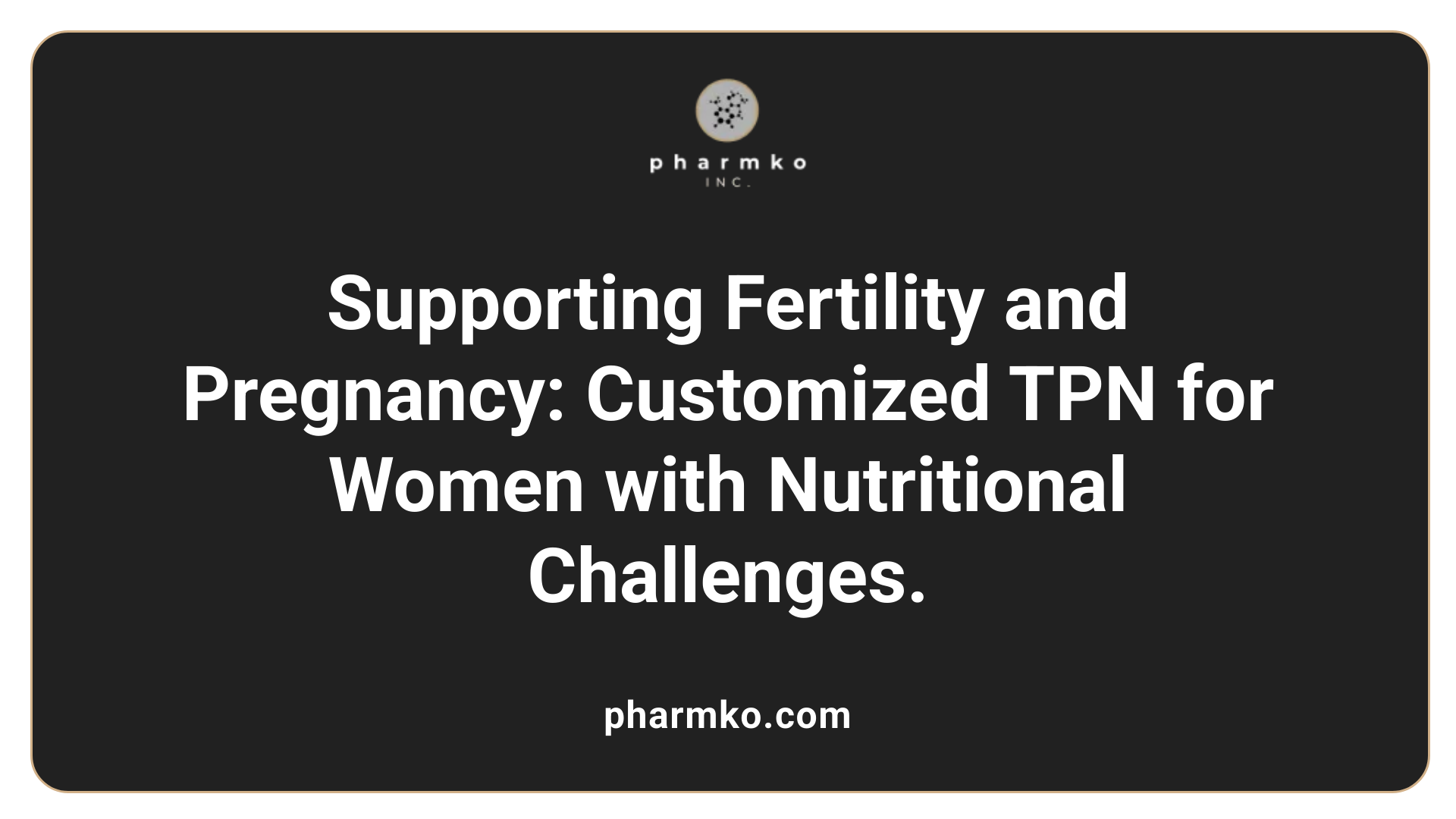The Importance of Tailored TPN Solutions for Fertility Patients
Understanding the Crucial Role of Tailored Nutrition in Reproductive Success
In the evolving landscape of fertility treatment, personalized healthcare has emerged as a cornerstone for improving outcomes. One vital aspect gaining increased attention is the use of tailored Total Parenteral Nutrition (TPN)—a specialized, individualized nutritional approach that supports reproductive health and pregnancy success. This article explores how customized TPN solutions are transforming fertility management, emphasizing their significance for patients with complex medical conditions and the potential to enhance reproductive outcomes.
The Significance of Total Parenteral Nutrition in Medical Care
What is the importance of Total Parenteral Nutrition (TPN)?
Total Parenteral Nutrition (TPN) is a critical medical intervention that supplies essential nutrients directly into a patient's bloodstream. It is especially vital when the gastrointestinal tract is nonfunctional or its ability to absorb nutrients is severely impaired, making oral or enteral feeding impossible.
TPN provides a comprehensive mix of carbohydrates, proteins, fats, vitamins, and minerals tailored to individual patient needs. This ensures that patients maintain proper nutritional status, supporting healing, recovery, and overall health. It is frequently used in conditions such as bowel obstruction, short bowel syndrome, active gastrointestinal bleeding, and in post-surgical recovery.
The formulation of TPN is flexible, allowing healthcare providers to customize solutions based on specific patient conditions, including body weight, metabolic requirements, and deficiencies. Regular monitoring of nutrient levels, electrolytes, liver function, and metabolic balances helps prevent complications such as infections, liver issues, and metabolic disturbances.
While TPN can be life-saving, it also carries risks like infections, fatty liver disease, and electrolyte imbalances. Despite these challenges, TPN remains indispensable in managing patients who cannot meet their nutritional needs through normal eating. It not only sustains life but also provides the foundation for recovery and improved health outcomes.
Indications for TPN Use in Various Medical Conditions

What are common reasons a patient might need TPN?
Total parenteral nutrition (TPN) is a vital medical treatment that provides all necessary nutrients directly into the bloodstream when the digestive system cannot be used effectively. This method is essential in situations where oral intake or enteral feeding through the gastrointestinal tract is impossible or insufficient.
Patients with severe gastrointestinal disorders, such as bowel obstructions or fistulas, often require TPN to sustain their nutritional status. It is also used in cases of malnutrition, especially when the gut is nonfunctional or its absorption capacity is compromised.
Postoperative patients, particularly those recovering from abdominal surgeries or presenting with bowel complications, may need TPN during the recovery process to ensure adequate nutrition.
In neonates, particularly premature infants or those with congenital anomalies affecting the gut, TPN helps meet their rapid growth and development needs.
Patients with conditions like short bowel syndrome, Crohn’s disease refractory to other treatments, or active gastrointestinal bleeding are common candidates for TPN. For instance, individuals with Crohn's disease that does not respond to standard therapies or those with severe bowel damage often depend on TPN.
Moreover, TPN plays a crucial role in managing patients with bowel obstructions, high-output fistulas, or after major surgeries when the gut needs to rest.
Preoperative and postoperative support also rely on TPN, especially in patients who cannot eat or absorb nutrients adequately around the time of surgery. This ensures energy and nutrient delivery during critical periods.
Overall, TPN serves as a lifeline for patients who cannot meet their nutritional needs through conventional eating, improving outcomes and supporting recovery in complex medical conditions.
Ensuring Safety and Efficacy: Sterile Preparation and Administration of TPN

Why must TPN be prepared and administered under sterile conditions?
Total Parenteral Nutrition (TPN) is a complex therapy that delivers essential nutrients directly into the bloodstream, bypassing the gastrointestinal tract. Because of its invasive nature and the potential for introducing pathogens, sterile techniques are absolutely crucial.
Contamination during TPN preparation or administration can lead to severe infections, including catheter-related bloodstream infections (CRBSIs) and local skin infections. These infections can be life-threatening, especially in vulnerable patients such as those with compromised immune systems or critical illnesses.
To prevent such risks, healthcare providers follow strict aseptic procedures. This includes rigorous hand hygiene and the use of sterile barriers during catheter insertion and maintenance. The use of alcohol wipes and sterile equipment ensures that the TPN solution remains free of microorganisms.
Specialized filters, such as 1.2-micron in-line filters, are incorporated into the administration system. These filters help trap microbes and particulates, further safeguarding patients from infectious complications.
Maintaining microbiological safety through aseptic techniques not only prevents serious infections but also preserves the stability and effectiveness of the TPN solution. Strict protocols in preparation and administration are vital to achieving positive patient outcomes and avoiding potentially fatal complications.
Additional Considerations
Besides preventing infections, sterile practices help minimize other risks such as metabolic contamination, particulate embolism, and chemical incompatibilities that could compromise the therapy.
In summary, rigorous adherence to aseptic procedures, use of sterile equipment, and incorporation of microfilters are all essential components in the safe delivery of TPN. These measures protect patients, optimize nutritional support, and ensure the overall success of the treatment.
Guidelines and Protocols for TPN Delivery
 When administering total parenteral nutrition (TPN), adherence to strict protocols for tubing and filter changes is crucial for patient safety. Medical guidelines recommend that TPN tubing be replaced every 24 hours. This practice helps reduce the risk of microbial contamination and bloodstream infections, which are significant concerns in TPN therapy.
When administering total parenteral nutrition (TPN), adherence to strict protocols for tubing and filter changes is crucial for patient safety. Medical guidelines recommend that TPN tubing be replaced every 24 hours. This practice helps reduce the risk of microbial contamination and bloodstream infections, which are significant concerns in TPN therapy.
For lipid-containing solutions, the tubing and associated filters should be changed more frequently—every 12 hours—due to their higher tendency to promote microbial growth. This interval minimizes the risk of lipid embolism and bacterial proliferation within the infusion system.
The filters used in TPN administration also require regular replacement. Typically, these filters are changed every 24 hours for most solutions. However, when lipids are delivered separately, the filters should be replaced every 12 hours to prevent clogging and contamination. The micron size of filters depends on the solution; a common choice is a 1.2-micron filter for general TPN solutions, and a 0.2-micron filter for lipid-free PN. Following manufacturer guidelines is essential to ensure optimal performance.
Proper placement of filters close to the vascular access device helps prevent contamination of the bloodstream with microbes or particulates. Healthcare providers should also follow facility-specific policies and protocols for TPN preparation and administration.
In summary, meticulous attention to tubing and filter change schedules, alongside sterile techniques, helps maintain the safety and efficacy of TPN therapy, reducing potential complications such as infections, emboli, and metabolic disturbances.
Individualized TPN Formulation for Fertility Patients: Components and Customization
What is TPN and what are common reasons a patient might need it?
Total parenteral nutrition (TPN) is a specialized method of delivering essential nutrients directly into the bloodstream through a vein, bypassing the digestive system. This technique is crucial for patients who cannot utilize their gastrointestinal tract effectively due to various medical conditions.
Patients typically require TPN when they are unable to absorb nutrients through normal means, such as in cases of severe gastrointestinal disorders, bowel obstruction, or after certain surgeries. Additionally, premature infants with immature digestive systems, individuals suffering from intestinal failure, or those with high-output fistulas may depend on TPN for survival.
The formulation of TPN includes a precise mix of proteins, carbohydrates, fats, vitamins, and minerals tailored to each patient's needs. It can be administered for short periods during acute illness or as a long-term solution when the gut remains nonfunctional.
Nutritional components of TPN
The main components of TPN are:
- Proteins: Usually provided as amino acids, supporting tissue repair and growth.
- Carbohydrates: Delivered as glucose to supply energy.
- Fats: Administered as lipid emulsions to provide essential fatty acids and additional calories.
- Vitamins and Minerals: Including electrolytes and trace elements, essential for metabolic processes.
These components are combined in specific formulations that meet individual nutritional requirements, considering factors such as body weight, metabolic demand, and existing deficiencies.
Customization based on patient needs
Personalized TPN formulations are based on comprehensive patient assessments, such as medical history, physical examination, laboratory tests, and nutritional status.
For fertility patients, especially those with conditions like Crohn’s disease or short bowel syndrome contemplating pregnancy, the TPN mixture needs to support both general health and specific nutritional demands during gestation. Adjustments can include increased caloric content, specific amino acid profiles, and micronutrient supplementation tailored to prevent deficiencies and optimize reproductive outcomes.
In some cases, medications like GLP-2 analogs (e.g., teduglutide) may be incorporated indirectly to enhance intestinal absorption, reducing reliance on TPN. Overall, the goal is to ensure sufficient nutrient delivery while minimizing risks associated with overfeeding or nutrient imbalances.
Monitoring nutrient levels
Effective TPN therapy requires ongoing monitoring of nutrient levels, metabolic parameters, and organ functions. Regular blood tests assess electrolyte balance, kidney and liver function, and glucose levels. This vigilance helps adjust the formulation dynamically to prevent complications such as hyperglycemia, electrolyte disturbances, or liver dysfunction.
Patients should also be observed for signs of infections, catheter-related issues, or metabolic disturbances. Close collaboration among healthcare providers—including nutritionists, pharmacists, and physicians—is essential for optimizing outcomes and ensuring safe, effective nutritional support during fertility treatments or pregnancy.
| Aspect | Details | Additional Notes |
|---|---|---|
| Nutritional Components | Proteins, carbs, fats, vitamins, minerals | Tailored to individual needs |
| Customization Strategies | Based on history, labs, requirements | Supports pregnancy and specific health conditions |
| Monitoring | Blood tests, clinical signs | Prevents complications and adjusts therapy |
This personalized approach to TPN not only sustains health during critical periods but also helps optimize fertility and pregnancy outcomes by ensuring adequate and appropriate nutrition.
Role of Personalization and Precision Medicine in Reproductive Nutrition
Why must TPN be prepared and administered under sterile conditions?
Total parenteral nutrition (TPN) requires meticulous sterile preparation and administration to prevent serious infections, such as bloodstream infections caused by bacteria or fungi like Candida albicans. When impurities or microbes enter the bloodstream through contaminated intravenous lines or solutions, patients are at risk of severe complications, including catheter-related bloodstream infections (CRBSIs).
Maintaining a sterile environment involves strict hygiene practices, including handwashing, the use of sterile barriers, alcohol wipes, and sterile equipment during both preparation and administration. These measures help preserve the microbiological safety of the TPN solution. Use of specialized in-line filters with pore sizes around 1.2 microns further minimizes the risk of microbial contamination and particulates reaching the patient.
Aseptic technique is critical not just during the initial insertion of the catheter, but also for ongoing maintenance and medication delivery. Proper training of healthcare staff and adherence to established protocols are essential to prevent the introduction of pathogens. The ultimate goal is to safeguard this vulnerable patient population against preventable infections, ensuring the benefits of TPN—such as providing vital nutrition—are not offset by potentially life-threatening complications.
This careful approach to sterile preparation and administration aligns with personalized medical strategies tailored to each patient's medical history, current condition, and nutritional needs, especially in reproductive health scenarios where nutritional stability significantly impacts outcomes.
Implementation of TPN in Pregnancy and Fertility Treatment

How does tailored TPN benefit fertility patients, especially during pregnancy?
Total parenteral nutrition (TPN), when customized to the individual needs of patients, plays a crucial role in supporting women with complex gastrointestinal conditions during pregnancy. For women with conditions like short bowel syndrome (SBS) or chronic intestinal failure (CIF), tailored TPN provides essential nutrients directly into the bloodstream, bypassing the impaired digestive system.
This personalized approach ensures that both the mother’s and the developing fetus's nutritional demands are met effectively. Adequate nutrition is vital for healthy fetal growth and reducing pregnancy complications associated with malnutrition or nutrient deficiencies.
Moreover, the use of novel therapies such as GLP-2 analogs, including teduglutide, significantly enhances intestinal absorption. These agents stimulate intestinal growth and increase blood flow, which can reduce the dependence on TPN. As a result, women who receive such therapies may better tolerate oral or enteral feeding, decreasing the risks associated with long-term parenteral nutrition.
A notable case involved a woman with Crohn's disease and SBS who successfully carried a pregnancy without needing to resume TPN. This case underlines the importance of a personalized, multidisciplinary approach to nutrition management in fertility treatment.
Healthcare teams comprising obstetricians, gastroenterologists, nutritionists, and pharmacists work together to craft individualized plans. Continuous monitoring of nutritional status and adjusting therapies as pregnancy progresses are essential steps to optimize maternal and fetal health, ultimately enhancing the chances for successful conception and delivery.
Challenges and Future Directions in Personalized TPN for Reproductive Health
Why is personalized TPN important for couples facing fertility challenges?
Personalized Total Parenteral Nutrition (TPN) plays a vital role in reproductive health by providing tailored nutritional support to individuals with complex medical conditions. For women with issues like short bowel syndrome (SBS) or chronic intestinal failure (CIF), standard nutrition may not meet their specific needs, which can impair fertility and pregnancy outcomes.
Customized TPN formulations consider factors such as nutritional deficiencies, body composition, metabolic demands, and genetic or epigenetic traits. This customization allows healthcare providers to optimize nutrient delivery, reduce risks of complications like infections, fatty liver, or metabolic issues, and support successful pregnancies.
Emerging research highlights that advances in molecular personalization—incorporating genetic and epigenetic insights—could further refine TPN strategies. These developments aim to improve safety and efficacy, ensuring that nutritional management aligns precisely with each patient's unique reproductive health profile.
Ongoing efforts focus on addressing long-term safety concerns, such as metabolic disturbances and organ dysfunction, while enhancing protocols for higher precision in nutritional therapy. As science evolves, personalized TPN promises to become an even more crucial tool in optimizing fertility and pregnancy outcomes for patients with complex medical needs.
Harnessing the Future of Fertility Nutrition
The integration of personalized TPN solutions into fertility care represents a transformative advancement in reproductive health management. As research progresses and molecular techniques become more refined, tailored nutritional support will become increasingly critical in optimizing fertility outcomes and supporting pregnancies in women with complex medical needs. This personalized approach not only maximizes the efficacy of treatment but also improves safety, reduces complications, and enhances the overall health and well-being of both mother and child. Embracing this innovative paradigm paves the way for more precise, effective, and compassionate fertility care, ensuring every patient receives the nutrition support suited specifically to their unique biological and medical profile.
References
- Patient-tailored reproductive health care - PMC
- Parenteral nutrition
- The Role of Total Parenteral Nutrition (TPN) in SBS ...
- TPN Contraindications: What You Need To Know
- Total Parenteral Nutrition - an overview
- Successful Pregnancy in a Patient with Crohn's Disease ...
- TPN and Pregnancy: A Series of Successful Conceptions
- Total Parenteral Nutrition - StatPearls













